Over the past 14 months, we have run a Made in Ireland series which gives readers an insight into the high standard of engineering and fabricating that takes place with our machinery manufacturers. Depending on the manufacturer, some of this kit is built for the home market here in Ireland, while the remainder is manufactured for export worldwide.
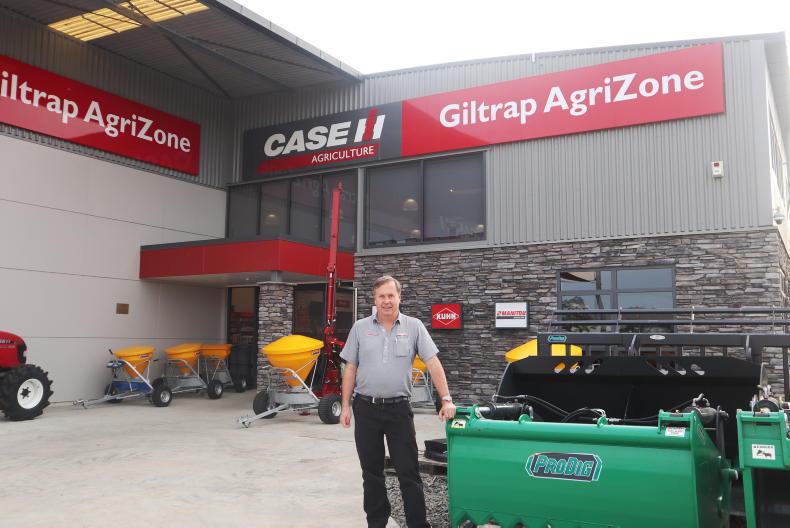
Andrew Giltrap pictured outside the Cambridge depot.
While travelling through New Zealand, we decided to follow the trail of Irish exports. We met Andrew Giltrap, owner of the machinery retail business Giltrap AgriZone. With grandparents originating in Bagenalstown, Co Carlow, before later moving to New Zealand, Andrew always carried the Irish link.
Predominately a Case IH dealership, Giltrap AgriZone’s retail businesses extends to three strong modern outlets, where five brands of Irish equipment are sold.
Business insight
Despite being up there with the New Zealand’s largest machinery dealerships, Giltrap AgriZone remains a family-run business. Now with three strong branches spread across 120km, the firm employs over 80 staff. Giltrap AgriZone had humble beginnings. It was started by Andrew’s father Wilfred, who began making bespoke machinery in 1959. In 1987, when New Zealand went through a major change with the removal of all subsidies, a retail-focused business was started.
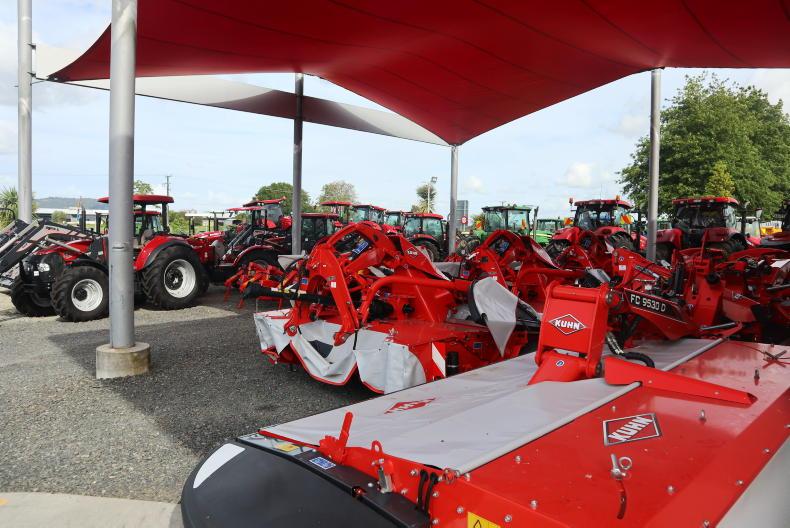
Giltrap is also a Kuhn dealership.
Today, Giltrap AgriZone is the top Case IH dealer in the North Island, retailing 180 new tractors each year. It also retails brands such as Kuhn, Manitou, Schuitmaker, Dalbo and Sumo. As previously mentioned, it handles five Irish brands, which contribute to an important part of the business.
The Irish connection
This Irish connection was initially sparked in the early 1990s when Giltrap began importing Tanco equipment into New Zealand. Then, in 2015, Pro Dig approached Giltrap through Enterprise Ireland. It first began selling bale slices and shear buckets to farmers, before moving on to push-off buck rakes and most recently fold-out silage forks to contractors. It also sells attachments to some JCB and Manitou dealers. Andrew said that the brand is now very well established in NZ.
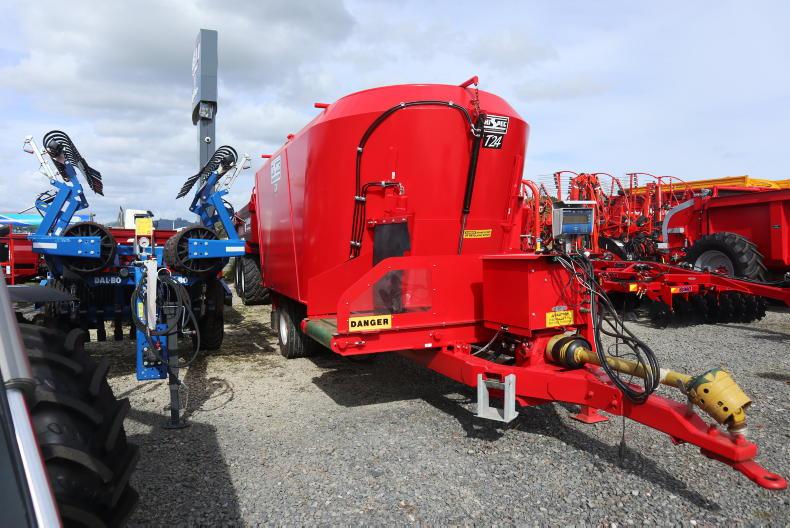
A HiSpec diet feeder which recently arrived in stock.

Giltrap sells the smallest to the largest Case IH-branded tractors.
In 2016, Andrew was looking to add a dung spreader and a diet feeder to his offering. Having assessed the options in the market, HiSpec ticked all the boxes. The simple side spreaders are retailed to farmers while Andrew claims he has never seen a product to handle all types of material like the larger Xcel dung spreader can. In recent years, he has begun importing tankers. Although low-emission slurry spreading techniques have not yet become a requirement, Andrew envisages this happening in the coming years.
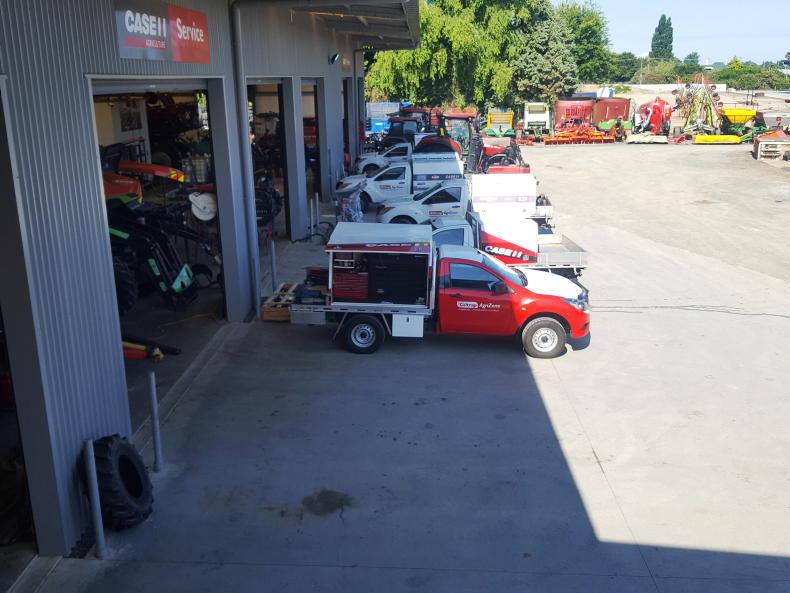
Half of the 80 staff employed across the three branches are service technicians.
In 2017, news broke that AGCO had acquired the forage division of Lely. Andrew had been a Lely dealer for 35 years and found himself seeking a manufacturer that offered a simple no-frills mower and, more importantly, a well-built tedder.
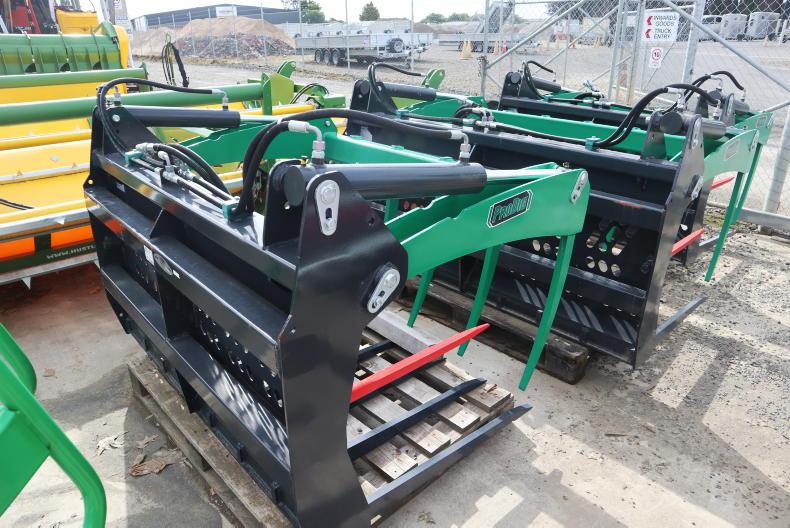
Some ProDig grabs ready for delivery.
Malone Farm Machinery in Mayo had made contact with Giltrap AgriZone during this time. An agreement was reached and a container of kit was imported. Despite the initial slow uptake, Andrew has said the last two years have really taken off for the Malone brand in New Zealand. So much so that the Procut range of mowers is now one of Giltrap’s best sellers. Andrew has said he is looking forward to seeing Malone’s new bale chaser.
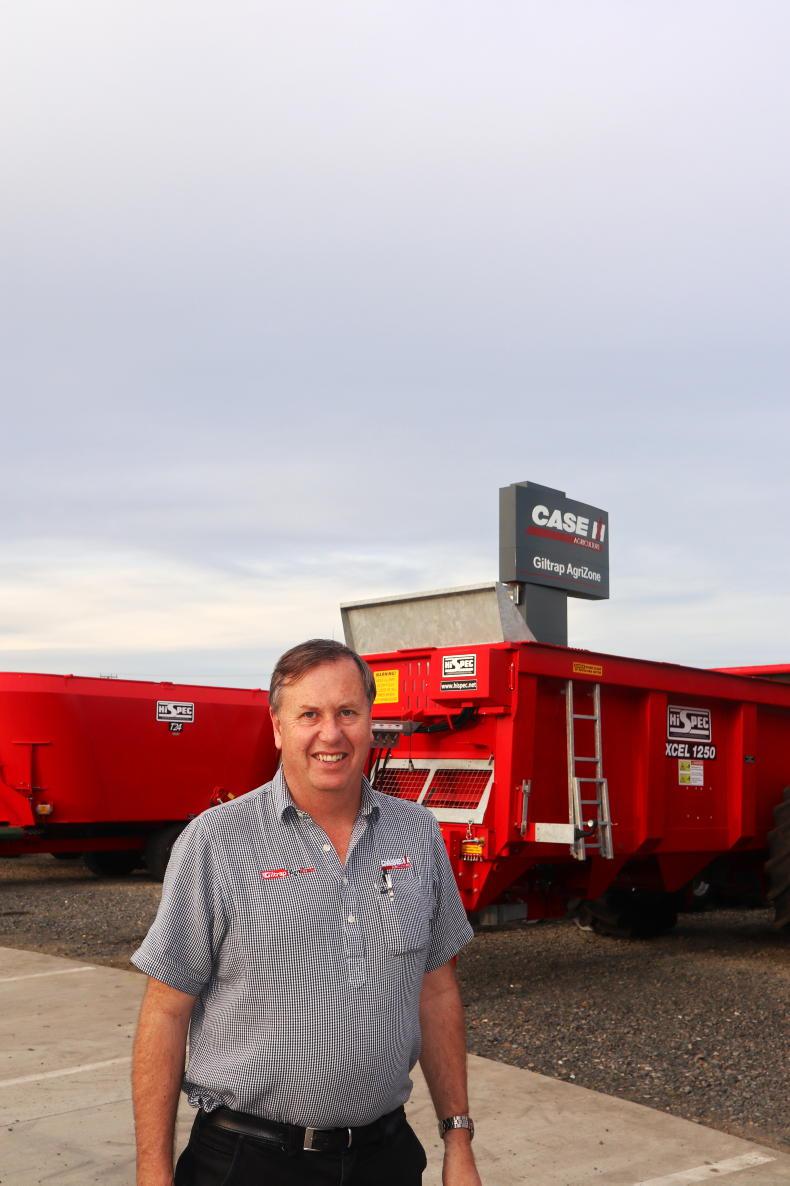
Andrew Giltrap.
Major Equipment has a large importer which covers both Australia and New Zealand. Giltrap retails Major equipment in a set territory in the North Island of New Zealand. Andrew noted that the company has retailed quite a few Cyclones for both agricultural and municipal work, and that they are a very robust machine. He added that they are just beginning to sell the Kildare-manufactured Doyle air seeders.

Similar to Ireland, Kiwi contractors are interested in the concept of grass mergers.
How does Irish machinery stand up to the New Zealand
conditions?
“We are very happy with how the Irish kit is working out. The New Zealand conditions are tough, similar in many ways to Ireland. The Irish kit is solid, simple equipment and we are seeing some great results. The market is a little bit different here to Ireland. The average farmer here doesn’t have much kit. They tend to use professional contractors.
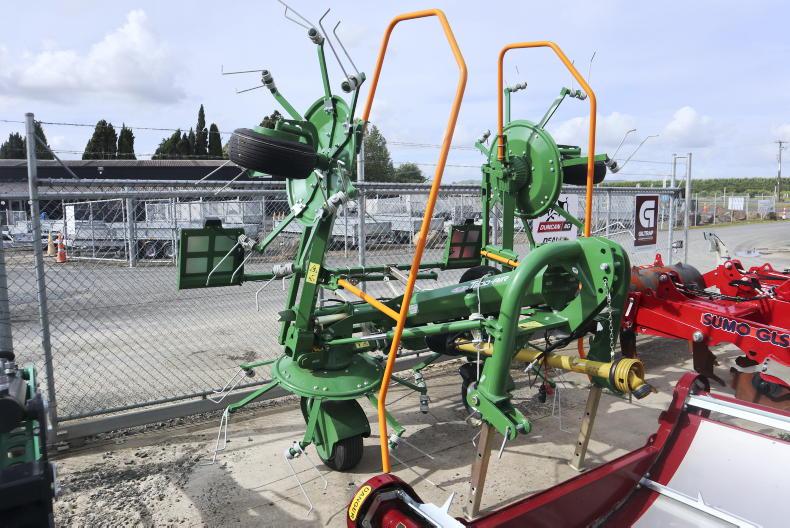
Conditioner mowers are quickly going out of fashion in NZ. Instead, tedders have grown in popularity.
“We retail quite a bit of what we import ourselves and through our friends and key partner, Cochranes. They are another Case IH dealership who have six retail outlets in the South Island. We also work through some smaller dealerships who assist with sales,” explained Andrew.
What is it like to work with a
typical New Zealand dealership?
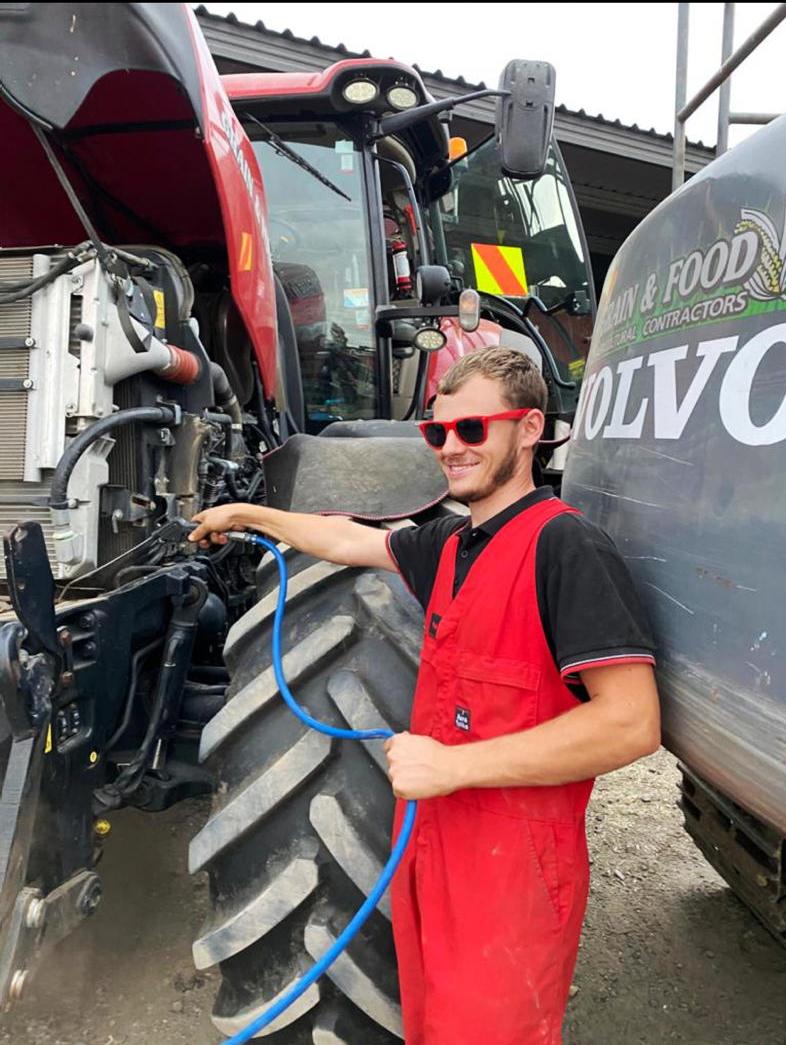
Paul Byrne.
As the old saying goes, to find out from the horse’s mouth, we caught up with Wexford native Paul Byrne. Paul is a CNH-trained technician and had worked with Case IH equipment in England, America, the Middle East and Africa, before taking on a job at Giltrap in New Zealand.
After initially working with a Kiwi contractor for a few months, Paul then spent six months with Giltrap before coming home to join the then recently opened Cooney Furlong Machinery Company in January 2018. A year and a half later, the NZ bug got the better of him again and he travelled across the world once more to take on an electrics and diagnostics technician role for six months with Giltrap.

Giltrap's Rotorua branch.
Paul explains: “I have worked in field technician roles around the world and have been based at several Case IH dealerships. Giltrap is definitely up there with my favourite. The work is very structured. The rota is scheduled, so someone different is on call every evening/night. Don’t get me wrong. There are plenty of long hours too, but if you are called to work past 5pm, you are straight away awarded a bonus.
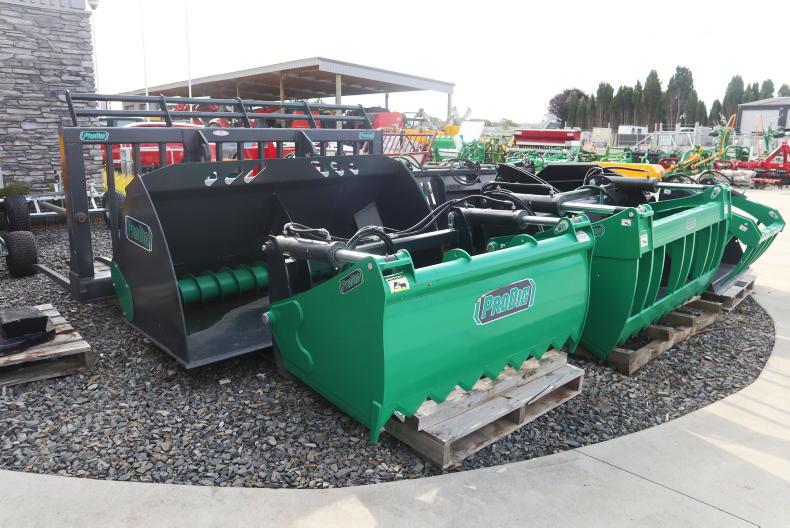
Giltrap began importing Pro Dig in 2015 through assistance from Enterprise Ireland.
“It also has its challenges. If you’re in an isolated field, phone signal can often be very poor. If you’re working a few hours away from the dealership, you have to make do with what you have.
“The same technical support available in Europe isn’t in New Zealand. Likewise, if you have to fix a machine and don’t have the unique part required, it may take 10 to 14 days to come from Europe.
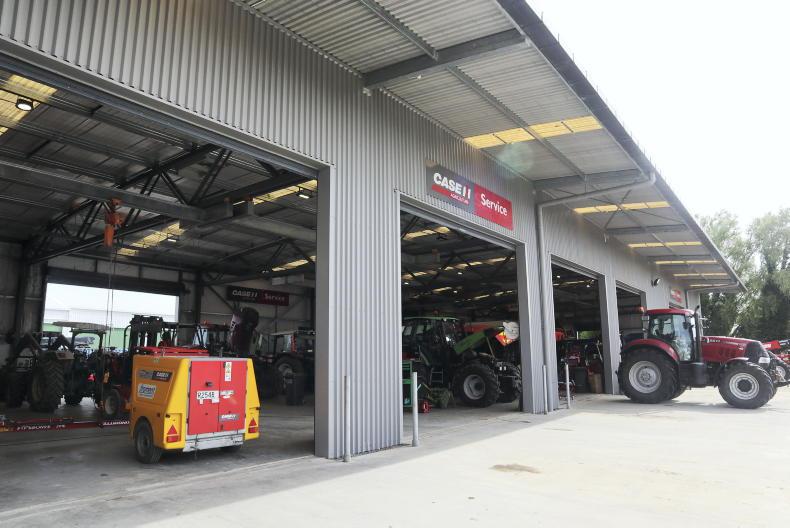
Giltrap's modern workshops.
“If working on a machine in the workshop, you are given a worksheet with the tractor’s full history. It’s small things like this that I haven’t come across elsewhere that come in handy.
“The workshop and jobs are very structured. It’s one place I’ve never seen a farmer/contractor to directly contact a mechanic. Everything goes through the office.
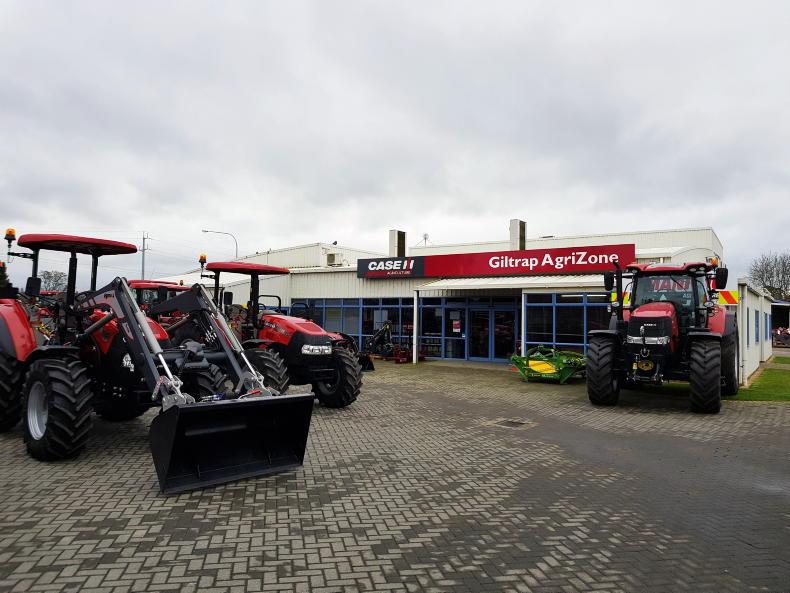
Giltrap's Otorohanga branch.
“In fairness, Giltrap and New Zealand, in general, are nice places to work. The Kiwis are very laid-back people and there’s a good work-life balance. The generally good weather means there’s always tomorrow too, which is a big help. I would definitely recommend the experience.”
Careers
Similar to what’s happening here in Ireland, skilled staff in the machinery industry are becoming harder to find. With this in mind, the personal development of staff is important to Giltrap. The firm, like other NZ dealerships, offers ongoing training for staff in all areas of the business.
Giltrap takes on some apprentices yearly and has an in-house apprentice coordinator to give support. Apprentices are given a startup toolbox, which becomes theirs after two years, while incentive schemes are in place alongside hard work recognition bonuses.
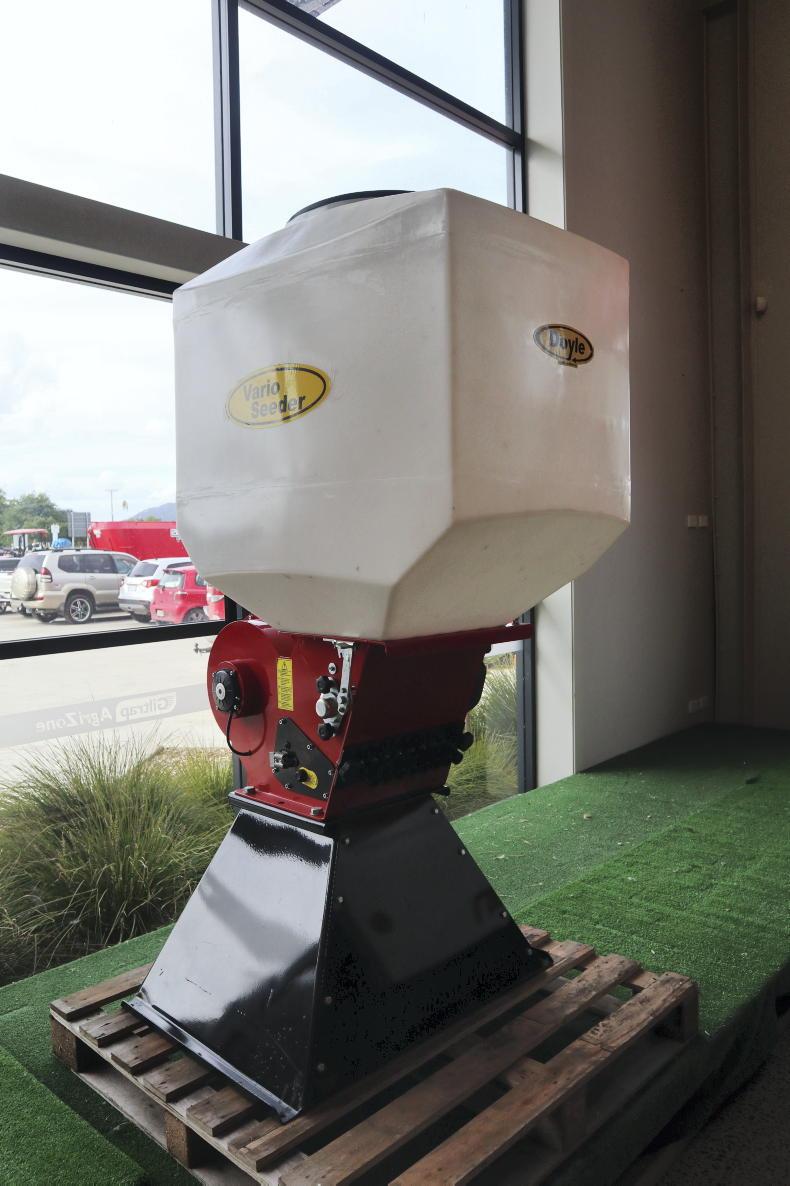
Giltrap is just beginning to sell the Kildare-manufactured Doyle air seeders.
Machinery trends
in New Zealand
The 10-year average for new tractor sales in New Zealand is 3,800 units. The zero to 40hp bracket accounts for 20% of total sales. These tractors go to “lifestyle farms”, which are very small holdings classified as hobby farmers. The 50hp to 100hp power band in New Zealand is mostly tractors that have been sold for horticultural use for enterprises such as kiwi fruit, apple orchards or vineyards. It makes up over 25% of the market.

Giltrap took on the HiSpec importer role in 2016.
Andrew explains that the general trends in tractor sales, like Ireland, are shifting towards higher-horsepower tractors. Over the past six years, the average tractor has moved from 80hp to 120hp. The 100hp to 150hp bracket accounts for 35% of new sales, while the 150hp+ bracket accounts for over of 20% of sales.
“Dairy farmers with 300 cows tend to have a basic 120hp to 140hp tractor with a front-end loader doing just 200 to 300 hours/year and sometimes a supporting older 90hp unit. Contractors typically buy one of two tractors – either a 200hp continuously variable transmission with GPS, VF tyres and all the bells and whistles or a very straightforward low running cost workhorse with a Tier 2/3 engine, manual spools and a powershift transmission,” Andrew adds.
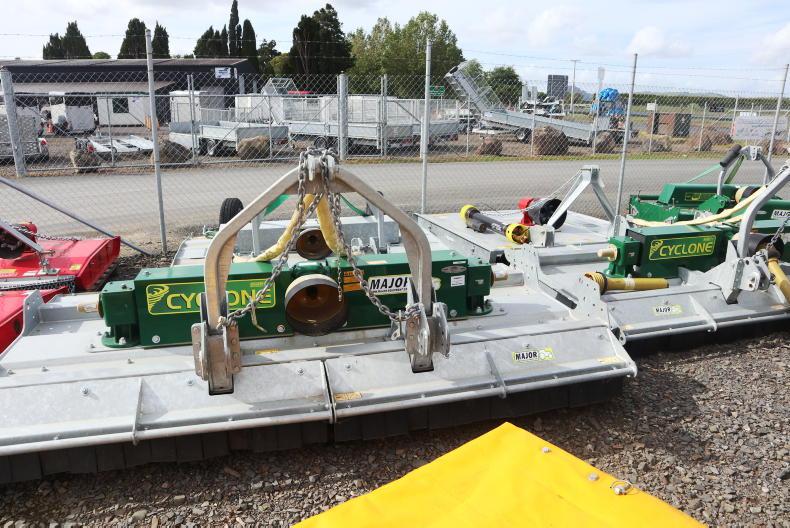
Giltrap retails Major Equipment in a set territory in the North Island of New Zealand.
Something interesting is that NZ has no off-road engine emission standards like we have in the EU. This means new tractors can be bought without all the emission regulation technology, allowing it to run a simpler tractor which contributes to a lower buying price.
Andrew says that most contractors have made the move to butterfly mowers and combination balers. Farmers in NZ want bigger and bigger mounted non-conditioner plain mowers. Trailed mowers have become rare, while conditioner mowers are also going out of fashion. Instead, tedders have grown in popularity. Grass mergers were just beginning to arrive on the market, with some interest from larger contractors.
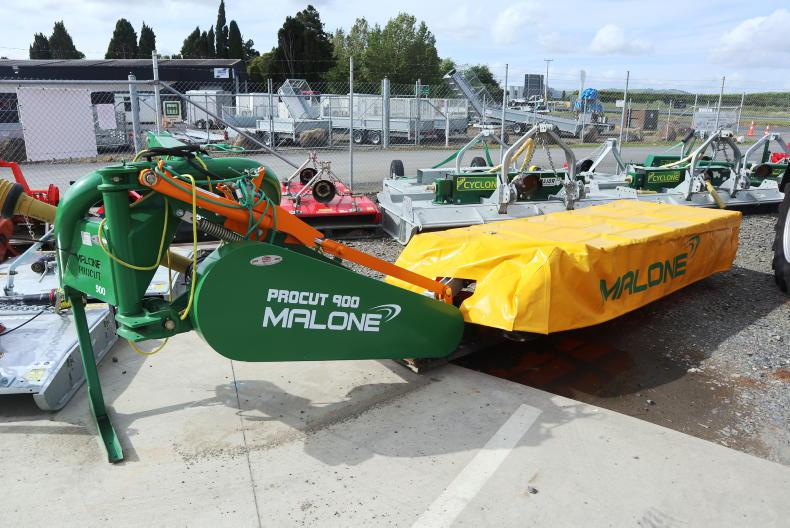
When AGCO acquired the forage division of Lely in 2017, it opened the doors for the Mayo-built Malone farm machinery.
Andrew says the general trend in recent years is that the more professional contractors are using larger machinery, while he has noticed a drop in farmers buying their own equipment. Instead, farmers are relying more and more on the professional contractor to carry out machinery-related work, while farmers are driving to run a more business-like model in today’s environment.
Over the past 14 months, we have run a Made in Ireland series which gives readers an insight into the high standard of engineering and fabricating that takes place with our machinery manufacturers. Depending on the manufacturer, some of this kit is built for the home market here in Ireland, while the remainder is manufactured for export worldwide.

Andrew Giltrap pictured outside the Cambridge depot.
While travelling through New Zealand, we decided to follow the trail of Irish exports. We met Andrew Giltrap, owner of the machinery retail business Giltrap AgriZone. With grandparents originating in Bagenalstown, Co Carlow, before later moving to New Zealand, Andrew always carried the Irish link.
Predominately a Case IH dealership, Giltrap AgriZone’s retail businesses extends to three strong modern outlets, where five brands of Irish equipment are sold.
Business insight
Despite being up there with the New Zealand’s largest machinery dealerships, Giltrap AgriZone remains a family-run business. Now with three strong branches spread across 120km, the firm employs over 80 staff. Giltrap AgriZone had humble beginnings. It was started by Andrew’s father Wilfred, who began making bespoke machinery in 1959. In 1987, when New Zealand went through a major change with the removal of all subsidies, a retail-focused business was started.

Giltrap is also a Kuhn dealership.
Today, Giltrap AgriZone is the top Case IH dealer in the North Island, retailing 180 new tractors each year. It also retails brands such as Kuhn, Manitou, Schuitmaker, Dalbo and Sumo. As previously mentioned, it handles five Irish brands, which contribute to an important part of the business.
The Irish connection
This Irish connection was initially sparked in the early 1990s when Giltrap began importing Tanco equipment into New Zealand. Then, in 2015, Pro Dig approached Giltrap through Enterprise Ireland. It first began selling bale slices and shear buckets to farmers, before moving on to push-off buck rakes and most recently fold-out silage forks to contractors. It also sells attachments to some JCB and Manitou dealers. Andrew said that the brand is now very well established in NZ.

A HiSpec diet feeder which recently arrived in stock.

Giltrap sells the smallest to the largest Case IH-branded tractors.
In 2016, Andrew was looking to add a dung spreader and a diet feeder to his offering. Having assessed the options in the market, HiSpec ticked all the boxes. The simple side spreaders are retailed to farmers while Andrew claims he has never seen a product to handle all types of material like the larger Xcel dung spreader can. In recent years, he has begun importing tankers. Although low-emission slurry spreading techniques have not yet become a requirement, Andrew envisages this happening in the coming years.

Half of the 80 staff employed across the three branches are service technicians.
In 2017, news broke that AGCO had acquired the forage division of Lely. Andrew had been a Lely dealer for 35 years and found himself seeking a manufacturer that offered a simple no-frills mower and, more importantly, a well-built tedder.

Some ProDig grabs ready for delivery.
Malone Farm Machinery in Mayo had made contact with Giltrap AgriZone during this time. An agreement was reached and a container of kit was imported. Despite the initial slow uptake, Andrew has said the last two years have really taken off for the Malone brand in New Zealand. So much so that the Procut range of mowers is now one of Giltrap’s best sellers. Andrew has said he is looking forward to seeing Malone’s new bale chaser.

Andrew Giltrap.
Major Equipment has a large importer which covers both Australia and New Zealand. Giltrap retails Major equipment in a set territory in the North Island of New Zealand. Andrew noted that the company has retailed quite a few Cyclones for both agricultural and municipal work, and that they are a very robust machine. He added that they are just beginning to sell the Kildare-manufactured Doyle air seeders.

Similar to Ireland, Kiwi contractors are interested in the concept of grass mergers.
How does Irish machinery stand up to the New Zealand
conditions?
“We are very happy with how the Irish kit is working out. The New Zealand conditions are tough, similar in many ways to Ireland. The Irish kit is solid, simple equipment and we are seeing some great results. The market is a little bit different here to Ireland. The average farmer here doesn’t have much kit. They tend to use professional contractors.

Conditioner mowers are quickly going out of fashion in NZ. Instead, tedders have grown in popularity.
“We retail quite a bit of what we import ourselves and through our friends and key partner, Cochranes. They are another Case IH dealership who have six retail outlets in the South Island. We also work through some smaller dealerships who assist with sales,” explained Andrew.
What is it like to work with a
typical New Zealand dealership?

Paul Byrne.
As the old saying goes, to find out from the horse’s mouth, we caught up with Wexford native Paul Byrne. Paul is a CNH-trained technician and had worked with Case IH equipment in England, America, the Middle East and Africa, before taking on a job at Giltrap in New Zealand.
After initially working with a Kiwi contractor for a few months, Paul then spent six months with Giltrap before coming home to join the then recently opened Cooney Furlong Machinery Company in January 2018. A year and a half later, the NZ bug got the better of him again and he travelled across the world once more to take on an electrics and diagnostics technician role for six months with Giltrap.

Giltrap's Rotorua branch.
Paul explains: “I have worked in field technician roles around the world and have been based at several Case IH dealerships. Giltrap is definitely up there with my favourite. The work is very structured. The rota is scheduled, so someone different is on call every evening/night. Don’t get me wrong. There are plenty of long hours too, but if you are called to work past 5pm, you are straight away awarded a bonus.

Giltrap began importing Pro Dig in 2015 through assistance from Enterprise Ireland.
“It also has its challenges. If you’re in an isolated field, phone signal can often be very poor. If you’re working a few hours away from the dealership, you have to make do with what you have.
“The same technical support available in Europe isn’t in New Zealand. Likewise, if you have to fix a machine and don’t have the unique part required, it may take 10 to 14 days to come from Europe.

Giltrap's modern workshops.
“If working on a machine in the workshop, you are given a worksheet with the tractor’s full history. It’s small things like this that I haven’t come across elsewhere that come in handy.
“The workshop and jobs are very structured. It’s one place I’ve never seen a farmer/contractor to directly contact a mechanic. Everything goes through the office.

Giltrap's Otorohanga branch.
“In fairness, Giltrap and New Zealand, in general, are nice places to work. The Kiwis are very laid-back people and there’s a good work-life balance. The generally good weather means there’s always tomorrow too, which is a big help. I would definitely recommend the experience.”
Careers
Similar to what’s happening here in Ireland, skilled staff in the machinery industry are becoming harder to find. With this in mind, the personal development of staff is important to Giltrap. The firm, like other NZ dealerships, offers ongoing training for staff in all areas of the business.
Giltrap takes on some apprentices yearly and has an in-house apprentice coordinator to give support. Apprentices are given a startup toolbox, which becomes theirs after two years, while incentive schemes are in place alongside hard work recognition bonuses.

Giltrap is just beginning to sell the Kildare-manufactured Doyle air seeders.
Machinery trends
in New Zealand
The 10-year average for new tractor sales in New Zealand is 3,800 units. The zero to 40hp bracket accounts for 20% of total sales. These tractors go to “lifestyle farms”, which are very small holdings classified as hobby farmers. The 50hp to 100hp power band in New Zealand is mostly tractors that have been sold for horticultural use for enterprises such as kiwi fruit, apple orchards or vineyards. It makes up over 25% of the market.

Giltrap took on the HiSpec importer role in 2016.
Andrew explains that the general trends in tractor sales, like Ireland, are shifting towards higher-horsepower tractors. Over the past six years, the average tractor has moved from 80hp to 120hp. The 100hp to 150hp bracket accounts for 35% of new sales, while the 150hp+ bracket accounts for over of 20% of sales.
“Dairy farmers with 300 cows tend to have a basic 120hp to 140hp tractor with a front-end loader doing just 200 to 300 hours/year and sometimes a supporting older 90hp unit. Contractors typically buy one of two tractors – either a 200hp continuously variable transmission with GPS, VF tyres and all the bells and whistles or a very straightforward low running cost workhorse with a Tier 2/3 engine, manual spools and a powershift transmission,” Andrew adds.

Giltrap retails Major Equipment in a set territory in the North Island of New Zealand.
Something interesting is that NZ has no off-road engine emission standards like we have in the EU. This means new tractors can be bought without all the emission regulation technology, allowing it to run a simpler tractor which contributes to a lower buying price.
Andrew says that most contractors have made the move to butterfly mowers and combination balers. Farmers in NZ want bigger and bigger mounted non-conditioner plain mowers. Trailed mowers have become rare, while conditioner mowers are also going out of fashion. Instead, tedders have grown in popularity. Grass mergers were just beginning to arrive on the market, with some interest from larger contractors.

When AGCO acquired the forage division of Lely in 2017, it opened the doors for the Mayo-built Malone farm machinery.
Andrew says the general trend in recent years is that the more professional contractors are using larger machinery, while he has noticed a drop in farmers buying their own equipment. Instead, farmers are relying more and more on the professional contractor to carry out machinery-related work, while farmers are driving to run a more business-like model in today’s environment.
























 This is a subscriber-only article
This is a subscriber-only article








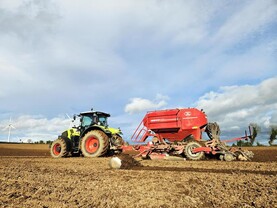



SHARING OPTIONS: